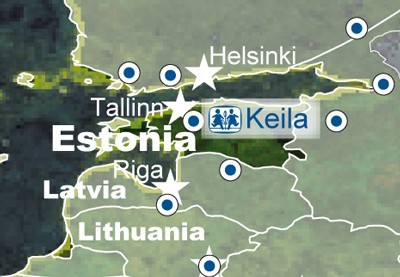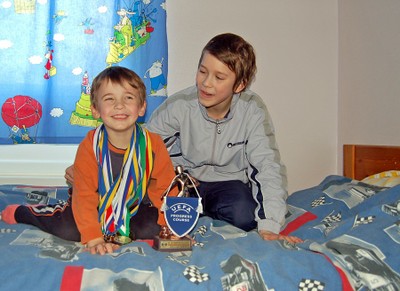SOS Children in Estonia
 Overview of Estonia
Overview of Estonia
Following the break up of the Soviet Union in 1990, the Baltic states of Estonia, Latvia and Lithuania regained their sovereignty. Estonia is the smallest and most northerly of the three. Although geographically a Baltic state, the country is closer to its neighbour Finland (only 100 km across the Baltic Sea) in terms of culture and language.
Estonia is considered to be the most successful of the former Soviet republics in economic terms, but it still has immense social problems in spite of relatively low unemployment, considerable foreign investment and a stable political situation. The cost of living is increasingly high and the education and social welfare system are both underfunded and under developed. Alcoholism is a widespread problem and the number of abandoned children is increasing.
Our Work in Estonia
Keila
We started working in Estonia in 1994. SOS Children’s Village Keila is located in the small town, approximately 30 km south-west of the capital, Tallinn. The Village has 12 family houses built in the traditional Estonian style in brick and timber. These are home to around 80 children and their SOS mothers. The community is well integrated into its surroundings in a mainly residential area, with schools and medical facilities all within easy reach. In 1995, we built an SOS Nursery and an SOS Primary School on the site, which take in children and pupils from the local community as well as from the SOS Village. Both schools have an excellent reputation due to the high standard of teaching on offer.
SOS Children own a house in Keila which is used as an SOS Youth Home for the older children from the Village. Teenagers and older children live here while taking their first guided steps towards independence. The first youths moved in here in September 1999. An additional SOS Youth Home in Tallinn opened in spring 2004. Together, the two SOS Youth Homes support up to 32 young people.
In 2004 SOS Children's Villages opened an SOS Social Centre in Narva operating a Family Strengthening Programme. The programme enables children who are at risk of being abandoned to stay with their biological families. Currently, up to 105 families in vulnerable situations are supported with services including material and psychological support, parental training and counselling.
A further two SOS Social Centres in Keila and Poltsamaa run educational projects for the local community. Parents and children are supported through the provision of psychological support and classes to improve parental skills. Specialist support is provided for parents who are raising children with special needs.
In May 2009 construction works began to extend of SOS Children’s Village Keila with three family houses; providing a home for an additional 20 children in need.
At present there is one SOS Children's Village in Estonia, one SOS Youth Home, one SOS Nursery and three SOS Social Centres.
For more information on the work SOS Children do in Estonia, see our page on Estonian Orphans.
Life in SOS Children's Villages Estonia: Tanel always wants to win
"I am so delighted to talk about Tanel. He is successful in his studies and also in football", says mother Sirje from SOS Children's Village Keila, Estonia.
Tanel, soon to be a 13-year-old, came to the village almost five years ago together with his two-month-old brother who was the youngest child ever taken into the village in Keila.
The brothers came to the village when Tanel had just finished the first grade of school and his mother was put into a nursing home because of her weak health. The only options for Tanel and his little brother were either an orphanage or the SOS Village. "Because of the age difference it was clear that they had no chance to be together in an orphanage," says mother Sirje.
SOS mother says that she is very happy with the boy's attitude and talents. "He has the best grades, maybe sometimes the singing is "four". I do not have to check if he has done his homework - he does it without being reminded. In this respect, he is an independent youngster."
Although he has only the best grades at school, there are some subjects he does not appreciate. "Nature and Estonian language are not among my favourites, but I have good grades because I remember everything from the lessons, so I don't have to learn much at home."
Tanel is an intelligent boy who can say "no" to his friends when he has homework to do, and unlike many modern youngsters, he loves to read.
His mother also praises the boy's habits at home. "He thinks that it's better to organise stuff at once than clean the mess later." The boys comment is plain and simple: "I hate cleaning!"
Local Contact
SOS Lasteküla Eesti Ühing
Pärnu mnt. 130-30
11317 TallinnEstonia
Tel: +372/656 6958
Fax: +372/656 6600
e-mail: office@sos-lastekyla.ee

 Return to Schools Wikipedia Home page…
Return to Schools Wikipedia Home page…
